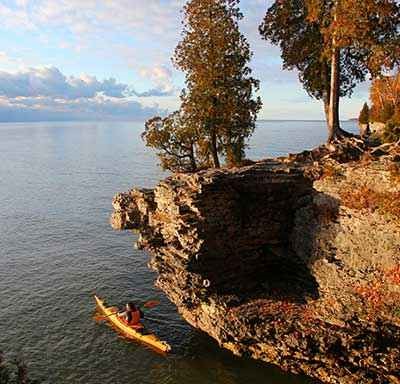Wisconsin’s tourism hubs are expecting a flood of visitors to enjoy the state’s recreation, food and event offerings. But businesses fear they won’t have the staff to accommodate them.
Door County is gearing up for its busy season, which is usually a bell curve of visitors from May to October. The northeastern destination’s largest economic driver is tourism. The peninsula is popular for its scenery, cherries and wine, among other things.
Based on visitor inquiries to the county’s website alone, Destination Door County Communications Director Jon Jarosh says travel interest is far greater than last year. Jarosh anticipates a busier season than that of 2019, when the state set new records for tourism.
So businesses are looking for workers. Jarosh noted that demand for staff is not unique to Door County or even Wisconsin — it’s a nationwide issue.
Door County businesses have been recruiting employees through jobsindoorcounty.com. Destination Door County just completed a recruitment campaign online and on social media directed at seasonal workers and college students from Chicago to Green Bay to head northeast for work. It also helps those workers find housing in the area.
“One of the things that makes it a little more challenging, and last year as well, has to do with international workers, and that has to do with the J-1 travel program,” Jarosh said. “Seasonal spots have come to rely on international students to help staff our seasonal tourism businesses for the simple fact that there’s not enough United States workers or locals or any college students to really handle the amount of jobs there are now.”
Stacie Tollaksen, the regional accounts director at Intrax Work Travel, said the J-1 Summer Travel Program dropped 95 percent from 2019 to 2020 due to COVID-19. The 5 percent of students who did come over had their visas before both the work visa ban was put in place or travel restrictions due to COVID-19.
President Biden let the ban expire last month. However, restrictions remain on travelers from some countries due to virus mutations or surges. And, American embassies — where students get their visas — are closed, short-staffed or delayed due to a multi-million visa backlog, Tollaksen said.
She said Wisconsin won’t welcome the 6,000 students as it had pre-COVID-19, but she expects more students will be arriving for the summer than last year.
Door County was home to about 500 international students in 2019. Jarosh said 2020 brought “hardly any” J1 students. Waterpark Capital of the World Wisconsin Dells welcomed more than 3,200 students in the summer of 2019 — summer 2020 brought about 400 students.
From Beber Camp of southern Mukwonago to northern Cable Nature Lodge, a host of Wisconsin businesses joined tourism entities nationwide in a letter to Secretary of State Antony Blinken. The group, as part of the Alliance for International Exchange, asked to waive J-1 application interviews, among other steps to boost international exchange.
“Without immediate intervention, the crisis facing the exchange community will be greatly heightened in the United States and abroad,” the alliance wrote.
Tollaksen said the rollout of COVID-19 vaccines and Americans getting a domestic travel itch is giving businesses in tourism areas reason to believe that they’ll be very busy this summer.
And Jarosh added that if businesses don’t have the staff needed to accommodate visitors, they’ll have to limit hours or capacity for whatever staff they are able to scrape together.
“If the participants can come here, it definitely would help our businesses be able to offer better services, be more open, they’d have higher occupancy, but I think it would help them recoup some of the business that was lost last year with COVID,” Tollaksen said.
But it’s two-fold, she added. Not only are international student worker shortages a huge economic factor, but it also impacts cultural exchange and public diplomacy. Tollaksen’s role is to oversee host employers and student participants in the Midwest and oversee other regions as well.
“On this program specifically, they can only come during their college years and for some countries, it’s only between their sophomore and junior year,” she said. “They might be losing the one opportunity they have in their life to come and experience the U.S. for a few months.”
One in three world leaders has been to the U.S. in an exchange program, she noted. And in her conversations with employers, American staff and host families are upset to lose out on the cultural exchange.
Jarosh is confident the resiliency of the tourism industry will carry through a labor crisis. He said Door County did a great job adjusting to increased demand for outdoor experiences.
“I’m confident and I know that we’ll rise to the occasion yet again this year as we do every year,” he said.
-By Stephanie Hoff
WisBusiness.com






